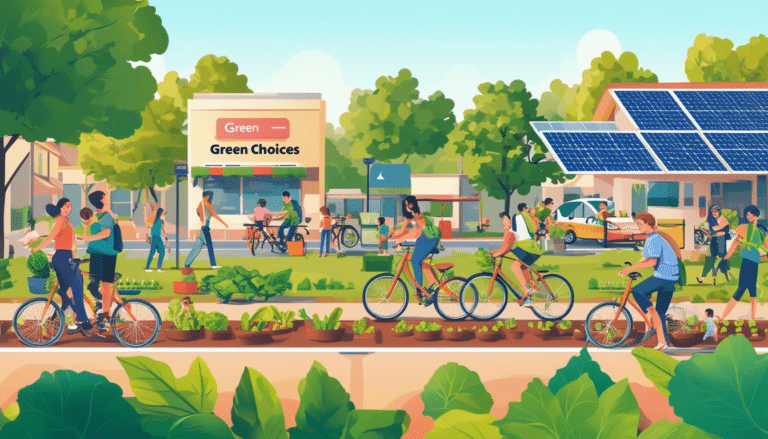Las políticas de sostenibilidad y su impacto en el consumo
In a world where environmental awareness is becoming increasingly relevant, sustainability policies emerge as essential tools to guide consumption behaviors towards more responsible practices. These policies aim not only to mitigate the negative impact of excessive consumption on the environment, but also to promote the development of economic models that support social well-being and the health of the planet. By integrating strategies that encourage conscious consumption, a direct connection is established between consumers’ decisions and their ability to positively influence sustainability in the long term, highlighting the importance of incorporating respect for the natural environment in all aspects of shopping behavior.
Sustainability policies have gained increasing relevance in contemporary societies, influencing consumer behavior and the way companies approach their strategies. This article explores how the implementation of these policies impacts consumers’ purchasing decisions, fosters responsible consumption, and ultimately contributes to environmental sustainability.
The importance of sustainability policies
Sustainable development seeks to ensure modes of consumption and production that meet the needs of current generations without compromising the ability of future generations. Sustainability policies are designed to address the environmental and social challenges associated with the rise of unsustainable production and consumption. These regulatory frameworks promote responsible practices and advocate for a balanced approach between economic growth and environmental protection.
Consumer awareness regarding sustainability
In recent years, a growing interest among consumers in integrating sustainability into their purchasing decisions has been observed. According to recent data, a significant percentage of global consumers identify as eco-active, showing concern for the environmental impact of the products they consume. This shift in consumer mentality is motivating companies to adapt their policies and products to meet this demand for conscious consumption.
What drives the change in consumer behavior?
The transformation of attitudes towards responsible consumption can be attributed to various factors, including the increasing information available about the state of the environment, as well as the rise of transparency in business practices. Recent studies reveal that many consumers now view sustainability as a key criterion in their purchasing decisions, opting for products that adhere to sustainable production practices.
Companies and their response to sustainability
In light of this changing landscape, companies are implementing stricter policies that align their business objectives with consumers’ sustainability expectations. Brands are beginning to recognize that incorporating sustainable practices into their business models is not only beneficial from an ethical perspective, but also from a commercial standpoint. This translates into greater investment in innovation and the adoption of technologies that promote sustainable consumption.
Examples of sustainable business initiatives
The food industry, for example, has seen a significant shift towards more organic products and plant-based diets, driven by consumers who value sustainability. Furthermore, numerous companies across various industries are promoting the use of biofuels and circular economy practices, contributing to the reduction of their carbon footprint and improving energy efficiency.
Challenges in implementing sustainability policies
While the incorporation of sustainability policies is a positive step, it also faces significant challenges. Often, companies struggle to balance consumer demands with the costs associated with implementing sustainable practices. Additionally, the lack of knowledge and understanding regarding sustainable practices can be an obstacle that prevents widespread change towards more responsible consumption.
The role of the consumer in sustainability
Consumers play a crucial role in pushing for sustainability. Their commitment to responsible practices, such as carpooling and energy efficiency, can influence the direction that business policies and government efforts take to promote a more sustainable future. Initiatives like these underscore how the collective awareness of consumers can lead to significant changes in responsible production and consumption.
Conclusion
Sustainability policies are reshaping the landscape of contemporary consumption, impacting both consumers and companies. As consumers adopt a more conscious mindset, the pressure on companies to adopt sustainable practices will only increase, fostering a cycle of positive change towards a more responsible and sustainable future.
For more information on the impact of technology on sustainability, visit this link. You can also explore the carpooling system and how it integrates into sustainability here. To learn more about the future of electric vehicles, feel free to consult this article. Examining major energy sources and their efficiency is essential, so visit this site. To join the energy-efficient community, explore this resource.
The increasing concern for sustainability has led companies and governments to implement various policies that promote more responsible consumption practices. These policies are essential for achieving a balance between production and consumption, and allow consumers to make more informed decisions about how their habits affect the environment. Through awareness campaigns and regulations, the goal is to encourage sustainable consumption and reduce the ecological footprint.
Legislation that promotes sustainability not only benefits the environment but also directly impacts consumer behavior. A growing number of people show interest in purchasing products that meet environmental and social criteria. This change in mindset is transforming the industry, as brands must adapt to meet these new expectations. Investing in sustainable practices, such as using recycled materials and reducing waste, thus becomes an essential business strategy.
As more consumers adopt conscious consumption, sustainability policies strengthen. Education about the impact of consumption on the environment helps consumers understand the importance of their choices. The implementation of environmental standards and the promotion of transparency in the supply chain are also crucial to building a trusting relationship between the consumer and the brand.
The interaction between sustainability policies and consumer behavior is, therefore, a driving element for achieving a greener and more responsible future. As companies continue to innovate and adapt to the demands of an increasingly conscious market, the potential to create a positive impact on the environment increases significantly.


